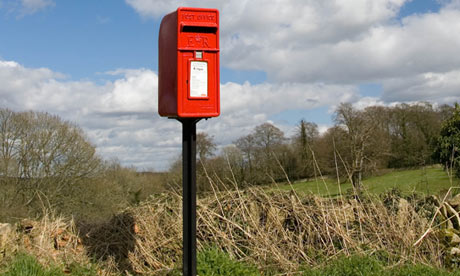The refusal to accept global warming is driven by corporate interests and the fear of what it will cost to try to stop it

'In the words of Nicholas Stern’s 2006 report, climate change is “the greatest market failure the world has ever seen”.' Photograph: Corbis
It's an unmistakable taste of things to come. The floods that have deluged Britain may be small beer on a global scale. Compared with the cyclone that killed thousands in the Philippines last autumn, the deadly inundations in Brazil or the destruction of agricultural land and hunger in Africa, the south of England has got off lightly.
But the message has started to get through. This is exactly the kind of disaster predicted to become ever more frequent and extreme as greenhouse gas-driven climate change heats up the planet at a potentially catastrophic rate. And it's exposed the David Cameron who wanted to "get rid of all the green crap" and who slashed flood defence spending by £100m a year as weak and reckless to his own supporters.
Of course there have been plenty of floods in the past, and it's impossible to identify any particular weather event as directly caused by global warming. But as the Met Office's chief scientist Julia Slingo put it, "all the evidence suggests that climate change has a role to play in it". With 4% more moisture over the oceans than in the 1970s and sea levels rising, how could it be otherwise?
If it weren't for the misery for the people at the sharp end, you might even imagine there was some divine justice in the fact that the areas hit hardest, from the Somerset Levels to the Thames valley are all Tory heartlands. It's the same with the shale gas fracking plans the government is so keen on: the fossil fuel drilling and mining so long kept away from the affluent is now turning up on their Sussex doorstep.
How do the locals feel that their government cut flood defences for the areas now swimming in water in the name of austerity, while one in four environment agency staff is being axed and the environment secretary, Owen Paterson, slashed his department's budget for adaptation to global warming by 40%?
Not too impressed, to judge by the polling. But then, paradoxically, Paterson is in fact a climate change denier in what was supposed to be "the greenest government ever", a man who refused to accept a briefing from the chief scientific adviser at the energy and climate change department, reckons there are benefits to global warming and thinks "we should just accept that the climate has been changing for centuries". Of course he's not alone among Conservatives in being what one of his cabinet colleagues called "climate stupid". The basic physics may be unanswerable, 97% of climate scientists agree that carbon emissions are dangerously heating up the planet, the Intergovernmental Panel on Climate Change warn it's 95% likely that most of the temperature rise since 1950 is due to greenhouse gases and deforestation, the risk of a global temperature rise tipping above 1.5–2C be catastrophic for humanity.
But the climate flat-earthers are having none of it. As a result, what should be a pressing debate about how to head off global calamity has been reframed in the media as a discussion about whether industrial-driven climate change is in fact taking place at all – as if it were a matter of opinion rather than science.
The impact of this phoney controversy during an economic crisis has been dramatic: in the US, the proportion of the population accepting burning fossil fuels drives climate change dropped from 71% to 44% between 2007 and 2011. In Britain, the numbers who believe the climate isn't changing at all rose from 4% to 19% between 2005 and 2013 (though the floods seem to be correcting that).
The problem is at its worst in the Anglo-Saxon world – which has also historically made the largest contribution to pumping carbon into the atmosphere. Take Australia, which is afflicted by longer and hotter heatwaves, drought and bushfires. Nevertheless, its rightwing prime minister Tony Abbott dismisses any link with climate change, which he described as crap, and has promised to repeal a carbon tax on the country's 300 biggest polluters. The move was hailed by his political soulmate, the Canadian prime minister and tar sands champion Stephen Harper, as an important message to the world. And in the US, climate change denial now has the Republican party in its grip.
What lies behind the political right's growing refusal to accept the overwhelming scientific consensus? There's certainly a strong tendency, especially in the US, for conservative white men to refuse to accept climate change is caused by human beings. But there shouldn't be any inherent reason why people who believe in social hierarchies, individualism and inequality should care less about the threat of floods, drought, starvation and mass migrations than anyone else. After all, rightwing people have children too.
Part of the answer is in the influence of some of the most powerful corporate interests in the world: the oil, gas and mining companies that have strained every nerve to head off the threat of effective action to halt the growth of carbon emissions, buying legislators, government ministers, scientists and thinktanks in the process. In the US, hundreds of millions of dollars of corporate and billionaires' cash (including from the oil and gas brothers Koch) has been used to rubbish climate change science. That is also happening on a smaller scale elsewhere, including Britain.
But climate change denial is also about ideology. Many deniers have come to the conclusion that climate change is some kind of leftwing conspiracy – because the scale of the international public intervention necessary to cut carbon emissions in the time demanded by the science simply cannot be accommodated within the market-first, private enterprise framework they revere. As Joseph Bast, the president of the conservative US Heartland Institute told the writer and campaigner Naomi Klein: for the left, climate change is "the perfect thing", a justification for doing everything it "wanted to do anyway".
When it comes to the incompatibility of effective action of averting climate disaster with their own neoliberal ideology, the deniers are absolutely right. In the words of Nicholas Stern's 2006 report, climate change is "the greatest market failure the world has ever seen".
The intervention, regulation, taxation, social ownership, redistribution and global co-operation needed to slash carbon emissions and build a sustainable economy for the future is clearly incompatible with a broken economic model based on untrammelled self-interest and the corporate free-for-all that created the crisis in the first place. Given the scale of the threat, the choice for the rest of us could not be more obvious.











